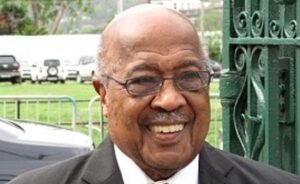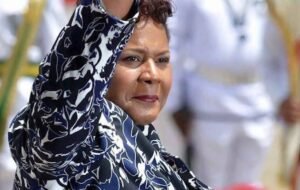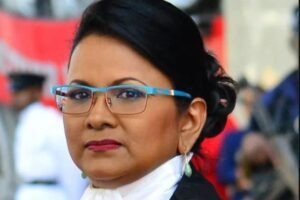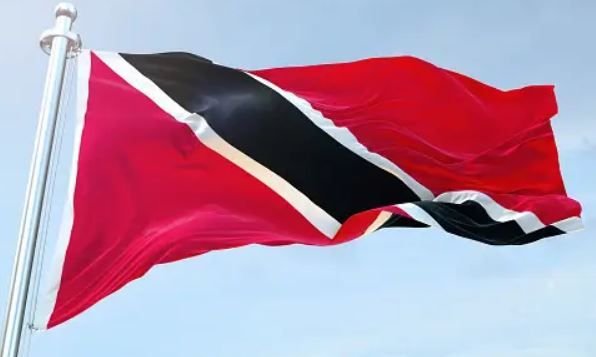This is the list of all Presidents of Trinidad and Tobago, Including their terms In office, and their political part:
President | Term Start | Term End | Time in Office | Political Party |
|---|---|---|---|---|
Sir Ellis Clarke | 1 August 1976 | 24 September 1976 | 10 years, 230 days | Williams, Chambers, Robinson |
Noor Hassanali | 20 March 1987 | 17 March 1997 | 9 years, 362 days | Robinson, Manning, Panday |
A. N. R. Robinson | 18 March 1997 | 16 March 2003 | 5 years, 363 days | Panday, Manning |
George Maxwell Richards | 17 March 2003 | 18 March 2013 | 10 years, 1 day | Manning, Persad-Bissessar |
Anthony Carmona | 18 March 2013 | 19 March 2018 | 5 years, 1 day | Persad-Bissessar, Rowley |
Paula-Mae Weekes | 19 March 2018 | 20 March 2023 | 5 years, 1 day | Rowley |
READ ALSO: List Of All Presidents Of Rwanda 1961-Present
Who Was The First President Of Trinidad And Tobago?

Ellis Emmanuel Innocent Clarke was the first President of Trinidad and Tobago. He was born on December 28, 1917, in Belmont, Trinidad and Tobago.
Clarke’s journey to becoming the first president started with his education. He went to Saint Mary’s College in Port of Spain, where he was very good at math and won a scholarship in 1938.
Then he went to University College London and got a law degree. After finishing his studies, he was called to the bar at Gray’s Inn. When Clarke returned to Trinidad in 1941, he started his legal career in private practice.
His political career began when he became the Solicitor-General from 1954 to 1956. He then held important roles as Deputy Colonial Secretary and Attorney General until 1962.
After Trinidad and Tobago gained independence from Britain on August 31, 1962, Clarke became the country’s Ambassador to the United States, Canada, and Mexico. He also served as the Permanent Representative to the United Nations.
In 1972, Clarke was appointed as the Governor-General of Trinidad and Tobago, a position he held until 1976. On August 1, 1976, Trinidad and Tobago became a republic.
Instead, the country established the office of President, and Clarke was elected as the first President. His presidency lasted from August 1, 1976, to March 19, 1987.
However, he was re-elected in 1982 but chose not to run for a third term in 1987 because of political disagreements with the new government.
Clarke’s contributions to Trinidad and Tobago were notable. He was one of the main people who helped create the country’s 1962 Independence Constitution. During his presidency, he worked hard to promote national unity and uphold the Constitution.
Clarke received several honors for his work, including being made a Companion of St. Michael and St. George in 1960 and being knighted in 1972. Sadly, Ellis Clarke passed away on December 30, 2010, just two days after his 93rd birthday.
First Female President Of Trinidad And Tobago

Paula-Mae Weekes made history as the first female President of Trinidad and Tobago. She took office on March 19, 2018, which was a big moment for the country.
Paula-Mae Weekes was the sixth president overall and the first woman to hold this position since Trinidad and Tobago became independent in 1962.
Weekes was the only candidate nominated for the presidency, which meant she was elected without the need for a vote.
This showed a strong agreement among the major political parties, including the ruling People’s National Movement and the opposition United National Congress.
Paula-Mae Weekes was born on December 23, 1958, in Port-of-Spain, Trinidad. She went to Tranquillity Government Primary School and Bishop Anstey High School.
For higher education, she attended The University of the West Indies and graduated with a Bachelor of Laws in 1980.
After this, she got her Legal Education Certificate from the Hugh Wooding Law School in 1982 and started practicing law in Trinidad and Tobago that same year.
Weekes began her legal career as a State Counsel in the Office of the Director of Public Prosecutions. She worked there for 11 years. In 1993, she moved to private practice and started her chambers.
Her judicial career began in 1996 when she became a Puisne Judge. In 2005, she joined the Court of Appeal. She served there until she retired in 2016. She also acted as Chief Justice for a short time in 2012.
In 2023, after her term ended on March 19, she was appointed as co-chair of the United Nations High-Level Panel on the Teaching Profession.
Who Is The Current President Of Trinidad And Tobago

The current President of Trinidad and Tobago is Christine Carla Kangaloo, having taken her role as President on March 20, 2023.
Christine Kangaloo is the second woman to be President of Trinidad and Tobago. She is also the first person to have been both President and Vice President of the Senate in the country.
Christine Kangaloo was born on December 1, 1961, in San Fernando. Her parents are Carlyle and Barbara Kangaloo, and she is the fifth of their seven children.
She went to Grant Memorial Presbyterian Primary School and St. Joseph’s Convent in San Fernando. Then, she studied law at the University of the West Indies and graduated with honors in 1983.
In 1985, she got her Legal Education Certificate from the Hugh Wooding Law School and started practicing law. Christine Kangaloo had a long career in public service. She worked in her father’s law office from 1985 to 1992.
Later, she joined the Judiciary as an Assistant Registrar of the Supreme Court until 1996. She joined politics in 2001 as an Opposition Senator.
Over the years, she held several important positions, including Minister in the Office of the Prime Minister, Minister of Legal Affairs, and Minister of Science, Technology, and Tertiary Education.
In 2007, she was elected to the House of Representatives as the People’s National Movement (PNM) candidate for Pointe-à-Pierre.
In 2015, Christine Kangaloo became the President of the Senate. She held this position until January 2023 when she resigned to run for President. While she was Senate President, she acted as President of Trinidad and Tobago 33 times.
On January 20, 2023, she was elected as the seventh President of Trinidad and Tobago by the Electoral College of the Republic of Trinidad and Tobago.

